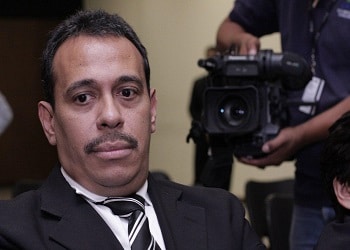The judge presiding over the so-called “Truce Trial” has chosen to acquit all 18 suspects, while indicating that El Salvador’s former President Mauricio Funes and former Justice Minister David Munguía Payés were the real instigators of the 2012 truce between the government and the country’s powerful gangs.
Smiles and embraces were shared between the former Penitentiary System Director Nelson Rauda, and his former subordinates as the verdict of the “Truce Trial” was read on August 29. A criminal court acquitted all 18 individuals, who were charged with introducing prohibited objects in prisons, moral turpitude, and conspiracy linked to a truce between El Salvador’s main gangs during the Funes administration, between March 2012 and May 2013.**
*This article originally appeared in Factum and has been translated, edited for clarity, and reprinted with permission. Its views do not necessarily reflect those of InSight Crime. See Spanish original here.
The Attorney General’s Office had requested 18 years of prison for Rauda and the former Inspector General of the Penitentiary System Anílver Rodríguez; 12 years for the former mediator Raúl Mijango, who did not attend the hearing for health reasons; 14 years for the assistant inspector of the National Civil Police (PNC) Roberto Castillo Díaz; and six years for members of parole councils.
In the judge’s opinion, the Attorney General’s Office did not prove that the suspects acted deliberately. Rather, the judge considered that they were following their duties as state officials. This reasoning applied to Mijango, who was awarded a special position affiliated with the Justice and Public Security Ministry, then under the leadership of General David Munguía Payés. The judge added that the parole council members had suffered an injustice, having been accused for simply following orders. Furthermore, the subjects could otherwise have served as witnesses in the case.
Statements by Carlos Eduardo Burgos Nuila, alias “Nalo,” the former Barrio 18 gang member and witness for the prosecution testifying under plea agreement, were not discredited. But they did not lead to a single conviction. Attorney General Douglas Meléndez and the former head of special prosecutorial units had justified their decision to use Nalo’s statements only to charge those already involved in the trial — omitting his testimony on meetings between gang members and party representatives looking to commit electoral fraud in 2014.
Nalo had declared that both the Farabundo Martí National Liberation Front (Frente Farabundo Martí para la Liberación Nacional – FMLN) and Nationalist Republican Alliance (Alianza Republicana Nacionalista – ARENA) parties gave the gangs hundreds of thousands of dollars during the 2014 presidential campaign, as was also revealed by El Faro and Factum.
SEE ALSO: Coverage of Elites and Organized Crime
Upon delivering his sentence, the judge argued that based on the evidence presented during the trial, the gang truce was a security policy developed under the Funes administration. The judgement therefore defined the truce as an elaborate plan for which Funes and Payés were jointly responsible, having collaborated to “order and adjust the truce.”
Neither Funes, currently in Nicaragua avoiding a graft probe, nor Munguía Payés, El Salvador’s current defense minister, have been indicted in relation to the truce.
What happened between June and August 2013, after the dissolution of the truce? Were there talks between politicians and gangs prior to 2011? This is part of the information that wasn’t revealed in the case, and which the judge considered decisive, because “as a security measure, [the truce] infiltrated the rest of the security institutions.”
The judge also highlighted the investigation’s shortcomings for not clarifying the role of the National Civil Police in the truce, and the lack of information offered by then-Police Director General Francisco Salinas, another one of the prosecution’s witnesses.
“Regardless of whether or not the subordinates fulfilled the executive orders with bad intentions, what about those giving the orders, and whether these [orders] were explicit or disguised?” the judge asked.
“Nelson Rauda Portillo, then director [of the Penitentiary System] was blamed here [in court]. Nelson Rauda was not the author … Those who held the operational command … were those in charge of the strategic direction of the government policy created,” he added.
SEE ALSO: Coverage of El Salvador’s Gang Truce
In this light, the judge said that “it should be determined what the police director at the time had to do with this strategy, what orders existed prior to 2011 and after June 2013. These are the investigations that the Attorney General’s Office should follow.”
Following the verdict, the prosecutor defended his arguments, asserting that “from the moment we presented the charges we believed that we could reach a sentence based on the elements at hand.” The official claimed to possess information that negated the judge’s hypothesis that Munguía Payés plotted the truce. He also declared that he could not make a legal assessment until he received the written sentence on September 21.
*This article originally appeared in Factum and has been translated, edited for clarity, and reprinted with permission. Its views do not necessarily reflect those of InSight Crime. See Spanish original here.
** Editor’s note: The Attorney General’s Office has announced it will appeal the decision.

